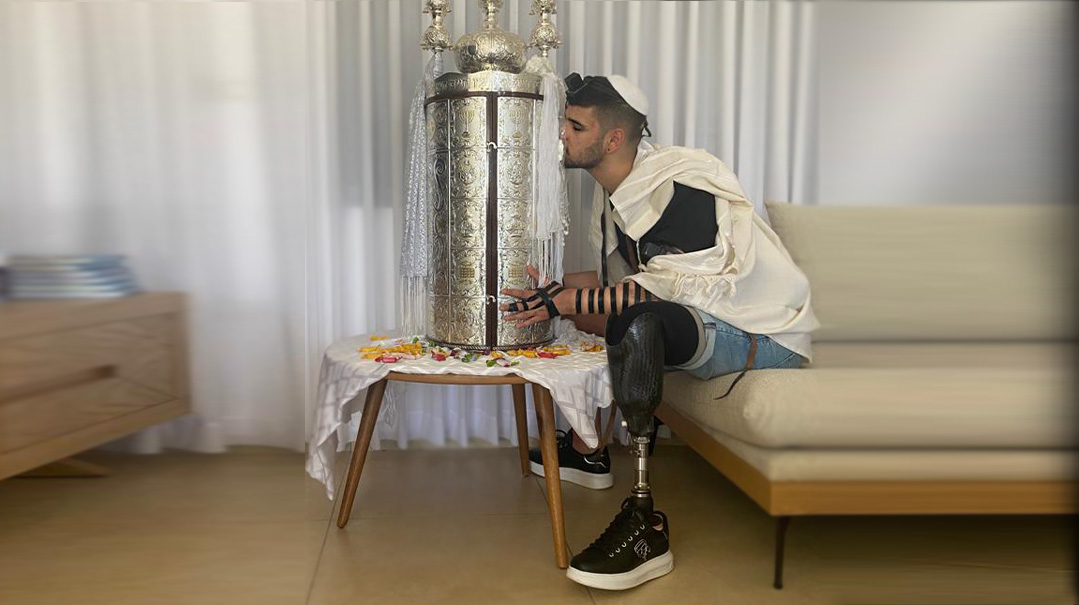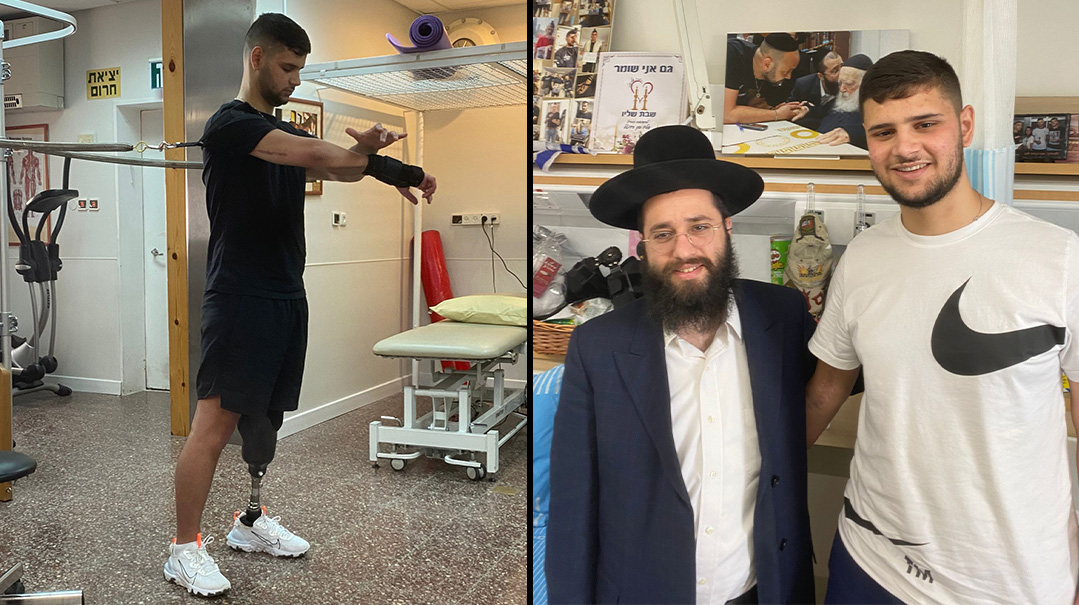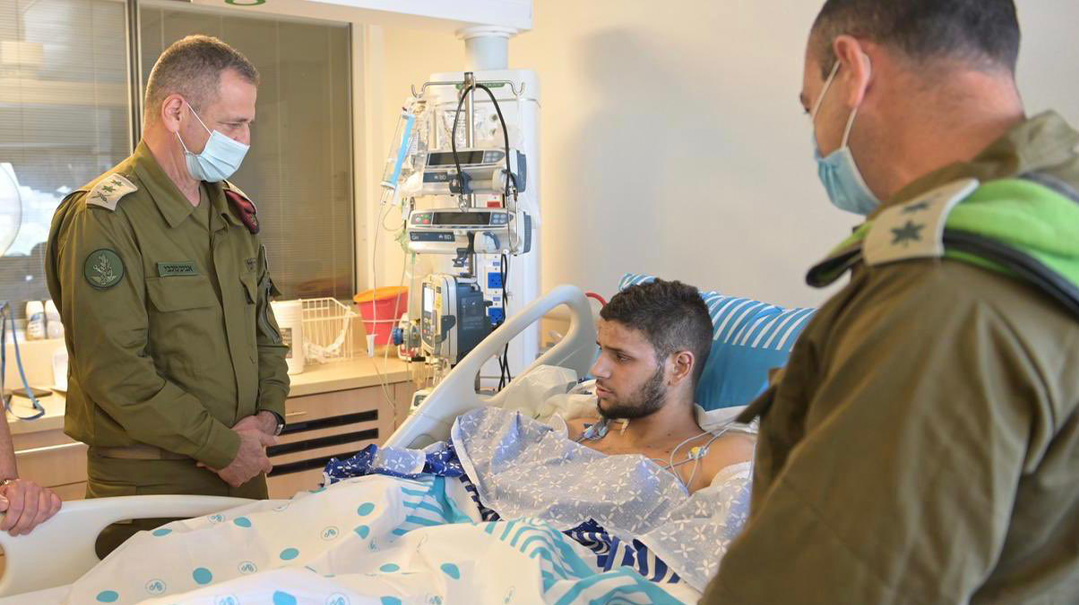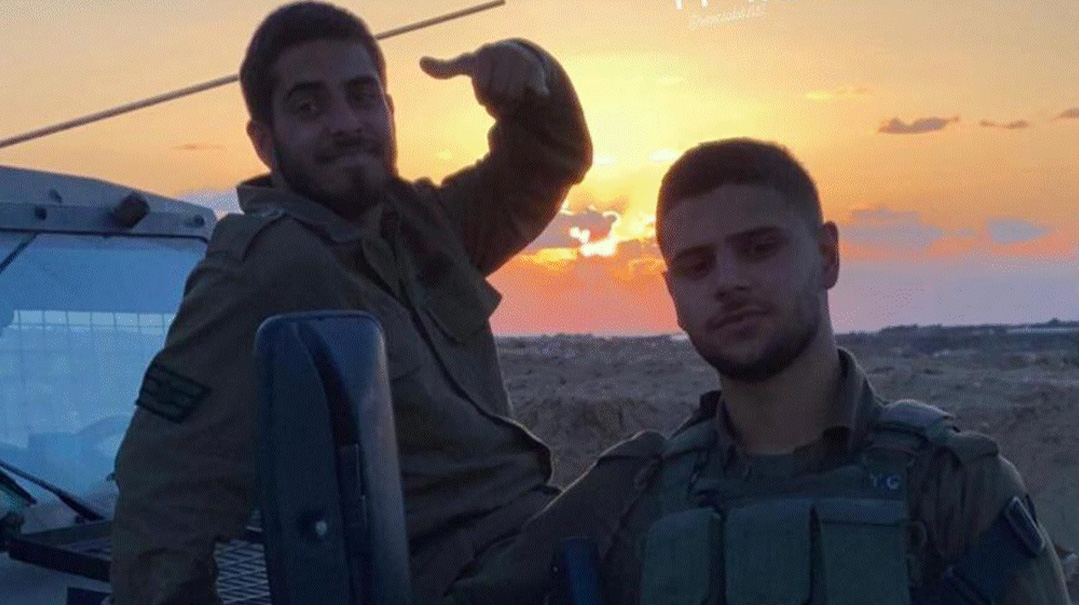Onward & Upward

An antitank missile took Shalev Bitton's leg, but not his faith

Ahospital rehabilitation department is a complicated place to visit. The very air feels like a combination of sadness and cautious hope.
Along the corridors of Tel Hashomer’s rehab center, there are patients in wheelchairs and some who have graduated to walkers, but one thing they have in common: All of them are recovering from severe injuries, trying to get back to themselves as best they can, to restore their maximum abilities — and also to get used to a disability that will be with them for life.
As I get closer to Room 6, Shalev Bitton’s room, I feel my hands getting clammy. What do you say to such a young man who was critically wounded from an antitank missile, who has spent the last year in the hospital? What do you tell someone who lost his leg and his close friend?
But Shalev Bitton solved my dilemma. He opened the door to the room himself — standing on two legs — his right leg, and his left prosthesis. And he’s as hospitable as can be, under the circumstances. “Welcome to my little kingdom,” he says, breaking the ice as he points around the spacious room whose centerpiece is a hospital bed, the walls lined with photos and letters of encouragement.
“So, how are you?” I ask.
Bitton looks directly at me, but not in an unfriendly way. “Do you really want to know?” he asks. “Baruch Hashem, I feel good. I thank Him for every minute that I am here, and believe me, it’s not to be taken for granted.”
When Life Stopped
It was the end of May last year, the third day of Operation Guardian of the Walls. Two weeks before, Hamas fired a barrage of rockets toward Jerusalem, and over the course of the next 12 days, Hamas and the Palestinian Islamic Jihad, two terror organizations within the Gaza Strip, fired nearly 4,400 rockets at Israel, most of them indiscriminately at Israeli civilians.
The retaliation operation lasted just 11 days, but it was one of the most intense wars between Israel’s military and Hamas and Palestinian Islamic Jihad terrorists in the Gaza Strip.
Shalev Bitton was dispatched to the Gaza border together with his good friend and the brigade’s deputy commander Omer Tabib Hy”d. As they drove their surveillance jeep, an antitank missile from the other side of the border fired at them, struck the vehicle and set it on fire. Bitton was critically wounded, another officer was moderately injured, and Omer Tabib was killed on the spot.
“Honestly, I don’t remember anything that happened,” Bitton relates. “It’s like it was erased from my brain. Maybe that’s good, because from what they tell me, it doesn’t sound like it was a scene I’d want to remember. The first memories I have are only of about a week later, when they reduced the sedatives and I began to wake up.”
“Not only did Shalev’s life change, the whole family’s life changed,” says Yigal Bitton, Shalev’s father. “I was at the mechanic waiting for them to fix my car when I got a call from military personnel. The attack happened around 10:30 in the morning, but they only contacted us about four hours later. I don’t think I’ve ever had such a hard conversation — I couldn’t believe this was really happening to us.”
The Gaza Strip was not unfamiliar territory to Yigal Bitton, even though he lives with his family at the other end of the country, up north in Rosh Pina. He’d recently been released from his own permanent army service, and had also served in Gaza, where he felt confident that he was doing his part to protect Israel’s civilians.
“But you know, with all my experience in the army, and the numerous casualties I’ve accompanied — when it touches you, it’s something else entirely.”
They told Yigal that Shalev had been fired at while in a jeep, and that he was critically wounded and in the hospital. Yigal didn’t have too many details, but he knew his son’s life was hanging in the balance, and so he and his wife got into a taxi and sped to Barzilai hospital in Ashkelon, the medical center closest to the Gaza Strip, praying the entire way that they’d find their son alive.
Shalev’s parents arrived to a sight Yigal says no parent should ever see: “My son was covered with burns, unconscious, connected to a respirator. We could hardly recognize him. They told us the next 48 hours would be critical.”
For the next two weeks, Shalev was unconscious and sedated, while his parents were by his side, holding his hand and talking to him, having no idea whether he heard them — or whether he would ever again hear them or respond. But then he opened his eyes, and the doctors too became slightly optimistic that he might indeed survive.
“They explained to us that the fact that Shalev woke up was a sign that he’d actually be treatable,” says Yigal. And he was soon transferred to Tel Hashomer, which has highly specialized departments that could treat his multi-system injuries.

“There have been so many good people who have davened for us and taken on kabbalot. I’m sure that’s why Shalev is making it”
You Can Recover, Too
Shalev Bitton says his first memories after the attack coincide with the point when he woke up. “From the first minute, I realized that I’m lying in a bed, injured. I saw my bandages and my arms at my sides, but I couldn’t move them. Through the haze of pain medication and drifting in and out of consciousness, the realization kicked in that my situation was not bright at all.”
And then he realized he’d lost his leg.
“No one needed to tell me. A day after I woke up, as the nurses came to change my bandages, I watched as they changed the dressings on my hands, and then on my right leg. When they took the bandages off the left leg, I discovered that it was cut off beneath the knee. And then I realized that I had lost it. But it was on a level of seeing, not internalizing. Because I was so loaded up with sedatives and painkillers, I couldn’t exactly be that alert about what was going on around me.”
After the transfer to Tel Hashomer, the Bitton family began to adjust to their new lives. Shalev’s parents, his 25-year-old sister and 15-year-old brother moved to an apartment on the sprawling hospital campus, so that they could give him 24-hour attention.
Throughout the months, Shalev moved from the ICU to the trauma unit, and later from hand surgery to orthopedics. The doctors, he says, were more angel than human. “They fought for me all the way,” he says. “Sometimes they’d come to the hospital when it wasn’t even their shift in order to treat me.”
While he’s been in rehab for several months, Shalev is still occasionally sent back for surgery and various other treatments. “In my left arm,” he relates, “they inserted an implant instead of my elbow. They reattached a few fingers and I’ve been in treatment to regain the use of my arms. And of course, I was fitted for a prosthesis on my left leg. I’ve had surgeries on different parts of my arms, and on one ear. Meanwhile, the rehab team works with me on the simplest actions, like drinking a cup of water, or rubbing my eye.”
Although the results of his hard work and a dedicated medical team are evident, Bitton admits that his condition is far from optimal. “At the beginning, when the situation was so much more serious, I could console myself that it was just a matter of time, and ultimately, everything would work out, that I’d be back to new. Now I know two things: that it probably won’t happen, and that if I don’t make a huge effort to work hard on the rehab exercises, my body won’t work the way I want it to. But I’m doing what I can, because I still have lots of plans for the future and that means I have to be strong. I did my part to fight in a war for Am Yisrael, and now it’s time to fight for my own life.”
Shalev says he gets his strength from Am Yisrael. “There is nothing like this nation,” he declares. “From the moment I opened my eyes, I’ve been constantly receiving messages from people who don’t even know me. Some of them have themselves been through some type of rehab, and they try to give me encouragement.”
Shalev tries to respond to all the messages he gets, but chizuk is a two-way street, and he gives strength to others as well. It’s hard to remain unmoved in the face of his optimism, emunah and ratzon. In fact, the first thing he wrote to his friends after the attack was a message of hope and devotion:
“Hodu l’Hashem ki tov ki l’olam chasdo. Today, about two months after the explosion, is the first time I am putting on tefillin, thanks to the Borei Olam Melech Malchei Hamelachim, Who decided that my role in this world has not yet been completed, and therefore to save me. I still can’t put tefillin on my hand, but b’ezras Hashem we will get there. Today is my small victory. So it’s true that there is a long road ahead, and I still need lots of surgeries and rehabilitation, and it’s true that I’ll never get my leg back, but hey — I’m here! I’m alive and breathing, and I thank HaKadosh Baruch Hu for this at every turn.”
He’s quiet for a few minutes and then adds, “There is so much light and good in the world, we just need to open our eyes to see it. And this is the tip I recommend to everyone I know: Believe in yourselves. If I, who lost a leg, who lost feeling in both hands, lost consciousness, and almost my life, can still believe every day that I can recover from this — then everyone can believe.”

A visit from the military top brass. “Hashem knows if someone needs to answer for this, but it’s not my business”
Sweetening the Decree
After he saw the outpouring of love and devotion to his son, Yigal says he was sure Shalev would make it. “There were so many good people who davened for us, who organized shiurim, putting on tefillin, hafrashat challah, and made so many important kabbalot. I have no doubt that they have a huge role in Shalev’s amazing progress.
“Now you see Shalev, and everything seems so self-understood, but it’s not like that at all. I remember the doctors talking at the beginning. They weren’t giving a positive prognosis, and not much hope. But we are optimistic people, and believers, and never let ourselves for a moment think that the outcome would be different. And I’m sure all the brachos we got from great rabbanim helped to sweeten the decree.
“We had the privilege of receiving a brachah from Rav Chaim Kanievsky ztz”l. To this day, the people who were around him then keep contact with us. They call every so often and ask how Shalev is doing. It moves me that they don’t forget. We also received brachos from Rav David Abuchatzeria, when we visited him in Nahariya.”
But Shalev was not always as optimistic as he is today. “The truth is that the beginning was very hard,” he concedes. “I didn’t really understand what happened — I didn’t know my own body, I couldn’t move. Back then, the only thing I wanted was to go back to life the way it was, which will never happen.
“People ask me what I miss most about my old life. I miss walking. Just walking on two feet. Like any other person. You only appreciate it when you’re here, on the other side. But the biggest difficulty right now for me is the independence part. It’s always on my mind. Because what does a person need more than to function on his own? At first, it was more pronounced, because my right hand didn’t move and my left hand went through so many surgeries over nine months, until it could move. Throughout this time, I couldn’t do anything myself, and that means that others had to do every single thing for me. It’s not only the feeling of becoming so incapacitated — it’s the dependence on others. If I wake up at night and I want a drink, I know that if I don’t wake up my mother, no one will bring me a cup of water. That’s just one small example.”

Omer Tabib Hy”d and Shalev. “Thinking about what Omer would do continues to give me strength”
I Lost a Friend
Throughout all his personal pain, Shalev says the hardest thing he went through is when he learned his good friend Omer Tabib had been killed. “As soon as I opened my eyes the first time, I asked about Omer. I knew that he was also in the jeep. But no one wanted to tell me, they just kept saying, ‘He’s in the hospital, he’s been sedated.’ Only about six weeks later, the fog lifted and I suddenly began to understand. I begged my mother to tell me the truth. Ima started to cry and asked, ‘How strong are you?’ And I replied, ‘I’m strong…’ She didn’t continue, but I already understood.”
Shalev says his own positive attitude is really to Omer’s credit. And his own success will be Omer’s legacy.
“Omer was a really special guy, and my very close friend, killed just a month before his discharge. He always looked for ways to help, in any situation he found himself in. He was with me until his final moment, and I can tell you firsthand, that even during the most difficult times, he was able to create a positive atmosphere. Thinking about Omer and what he would do in my situation, how he surely would have found the good even through all this pain, continue to give me strength. I keep hearing him telling me to push forward and not fall into despair.
“One day, Omer’s mother came to visit me in here in the rehab center,” he adds. “As soon as she entered the room I started to cry and said to her, ‘I’m so sorry that I didn’t call to be menachem avel after I found out. I know you lost a son and I can’t fathom what that’s like, but I lost a brother.’ That’s really what I feel like.”
Shalev and his friends even opened a chesed organization in Omer’s memory. “There isn’t a day when I don’t think about how I can preserve Omer’s memory with this work, and that his goodness should continue to be here with us. I hope I can succeed in doing significant things for his soul.”
Only Gratitude
Over the year, Room 6 has become like Shalev’s second home. He has lots of visitors, and some of those guests have been military and defense ministry people. He even had a visit from Chief of Staff General Avi Kochavi. But Shalev says he never really followed developments in the investigation of the attack, whether there was negligence at the command level or whether the army had faulty information.
“What was, was. Who will it help if we’re busy delving into it? Believe me, Hashem knows everything, and if someone needs to answer for this — in the end, he’ll have to, somehow. So why do I need to be busy with it?”
A few days before Pesach, the family got the news they’d been hoping for: The medical teams felt it would be beneficial for Shalev to return home for the chag, and since then, he’s been traveling home every few weeks.
And since then, the Bitton family too has finally begun to return to some type of routine. “Each one of us is here with him for two days, and then we switch,” Yigal says, and then adds, “Once, if you would have told me our family would be living like this for a year, I would have thought it impossible. But now we’ve reached a certain point of peace, and we’ve all learned to express gratitude for what we have, for the light within the darkness.”
Shalev’s parents are looking forward to the day their son will be permanently released and able to get on with life, but Shalev himself is quite aware that life will never go back to being what it was in the past. “But I do dream of getting out of here and learning to live again,” he says. “It’s clear to me that there will be so many challenges after I am released — many of which I know about and some that will surprise me, but I feel that I’m ready to deal with it. Hashem should give me the strength not to capitulate or fall into despair.”
Shalev says that the most potent thing pushing him forward is the concern of a nation who’s kept him in their prayers. “The love and the messages I’m still getting from all directions, people I barely knew who’ve become like family, the tefillot, the hafrashat challah, the hakafot, the tekiot shofar, and the many sifrei Tehillim that people have recited on my behalf — all these things shake the Heavens.”
And it’s not only him. The recent rise in terror attacks has meant an influx of victims whose lives have been upended, some of whom are dealing with life-altering injuries. Through his own long haul, and onto the struggles of those latest victims, Shalev has one overarching plea: “Keep praying for us.”
(Originally featured in Mishpacha, Issue 918)
Oops! We could not locate your form.







